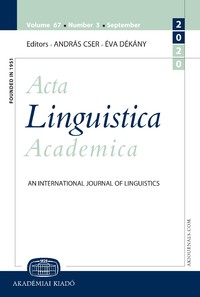Against phonologically-optimizing suppletive allomorphy (POSA) in Irish, Tiene, Katu, and Konni
Against phonologically-optimizing suppletive allomorphy (POSA) in Irish, Tiene, Katu, and Konni
Author(s): Nicholas RolleSubject(s): Phonetics / Phonology
Published by: Akadémiai Kiadó
Keywords: suppletion; phonologically-conditioned allomorphy; optimization; subcategorization; phonological representations
Summary/Abstract: Suppletive allomorphs may be conditioned based on their phonological environment. When the allomorphy distribution is phonologically natural, this has motivated theoretical models supporting phonologically-optimizing suppletive allomorphy (POSA), whereby the phonological grammar selects the suppletive allomorph whose output is least marked. This paper re-examines four cases argued to support POSA in Irish, Tiene, Katu, and Konni, and for each provides counter-arguments against this position. In contrast to POSA, I assert that the most straightforward analysis is to formalize the conditioning phonological environment via subcategorization frames, and that the burden of proof falls on proponents of POSA to show otherwise. Subcategorization correctly predicts that subcategorized phonological material is the only phonological material which suppletion can be sensitive to. [An appendix is provided which argues against POSA in another language, Udihe, and instead posits a single underlying form with gradient representations.]
- Issue Year: 68/2021
- Issue No: 1-2
- Page Range: 103-138
- Page Count: 36
- Language: English
- Content File-PDF

